This month we bring you some exciting developments and updates from the world of search including the release of an eagerly awaited Core Update from Google.
First and foremost, Google rolled out the August 2024 core algorithm update which is the second one this year. This follows months of feedback from creators since the previous updates, with Google stating that they have considered this feedback for this release.
Concerning the core update, Google has also revised a couple of pieces of documentation including their advice for recovery following a core update and a blog which covers new recommendations which will be a new feature in Google Search Console.
In other news, the ongoing antitrust trial is heating up with new allegations and implications against Google. Despite beginning in September last year, another federal trial is set to take place this month, which will focus primarily on Google’s role and dominance in digital advertising.
We’ll explore these updates and more in detail in the article below.
Allow our traffic light system to guide you to the articles that need your attention, so watch out for Red light updates as they’re major changes that will need you to take action, whereas amber updates may make you think and are definitely worth knowing but aren’t urgent. And finally, green light updates which are great for your SEO and site knowledge but are less significant than others
Keen to know more about any of these changes and what they mean for your SEO? Get in touch or visit our SEO agency page to find out how we can help.
In this post, we’ll explore:
- Google releases and completes its August Core Update
- What has been the impact of the update?
- Google updates its core update documentation
- How core updates work
- How to investigate a ranking drop
- Things to keep in mind when making changes
- Length of time to see the impact of changes
- Google anti-rust trial: Unraveling allegations and implications
- How does this impact SEO?
- Yelp sues Google over local search dominance
- Google is introducing recommendations to Google Search Console
- Does Google Search Console only show 35% of your data?
- State of SEO report: Top insights for 2025 success
- Top challenges
- Algorithm changes
- Budget constraints
- How could SEO change?
On 15th August Google launched their core update to Google Search. In a short blog article, they announced that the update is designed to improve the quality of search results but provide users with genuinely useful content, over content that was purely designed to do well in search.
They also add that this update has taken onboard feedback from creators over the last few months following the previous algorithm update in March, stating that they aim to improve the way they identify and reward sites that have taken the correct steps for improvement.
What has been the impact of the update?
Initial reports suggest that some websites that were negatively impacted by the previous core update have begun to see improvements in traffic and search rankings. While there was significant SERP volatility in the US during and after the update, it was less pronounced in the UK and throughout Europe.
At the beginning of the update, a Google ranking bug affected numerous search results. While this did affect rankings, it was unrelated to the update and the issue was fixed several days later.
Glenn Gabe, an SEO consultant at G-Squared Interactive, was also tracking visibility figures for over 390 websites and has noted that 18% of them have seen improvements during the rollout of the update.
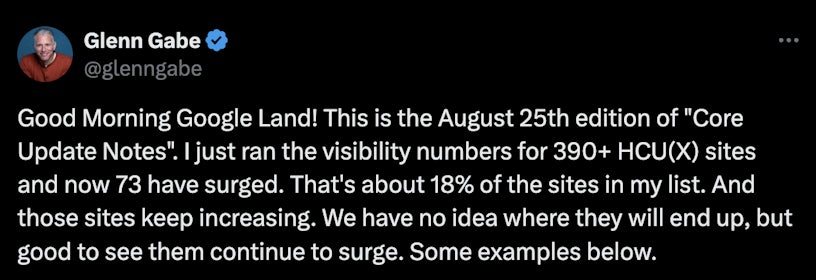
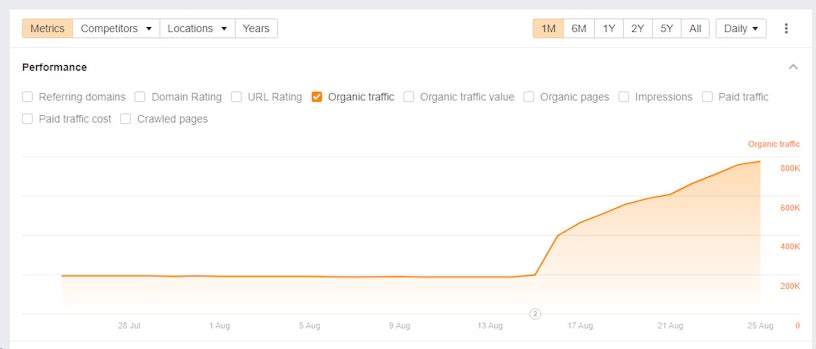

In another article published by SEO Roundtable, poll results suggest that the impacts from the August core update were evenly distributed between ranking/traffic seeing improvement and no change. When the data across each platform was combined, it appeared that most users saw a decline in ranking/traffic during the update.
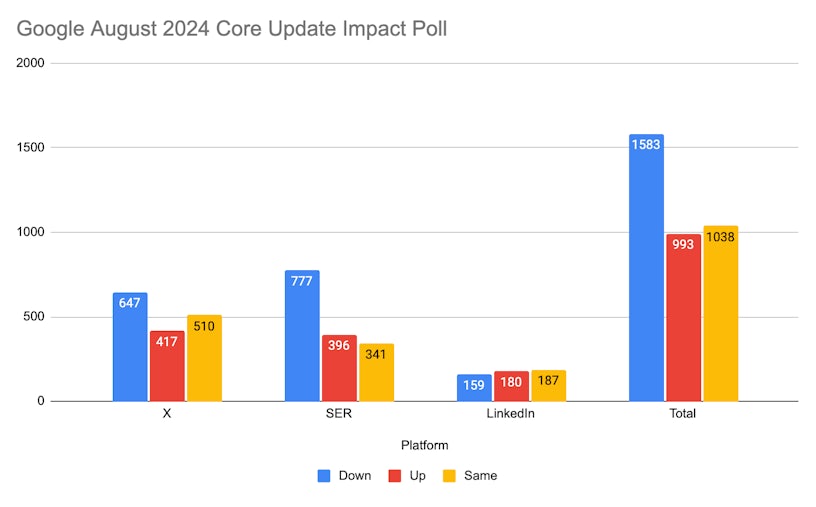
The impact of the core update on Google’s AI Overviews
With Google releasing their AI Overviews in the US back in May and since rolling them out worldwide, many people have had questions surrounding what impact the core updates will have on them. It has since been confirmed by John Mueller that core updates do affect them. Whilst it isn’t clear exactly how we can assume that it likely affects changes in the sources and how information is presented within the AI summaries. This presents many new questions for those in the SEO community and highlights the importance of adapting your content strategy to accommodate these new features.
If your website has experienced a drop in rankings, visibility or overall performance following an algorithm update, we can help. With our algorithm recovery services, we can work with you to help you understand why your site was affected and formulate a strategy to help you recover.
In addition to the release of the core update, Google has also updated its core update documentation. The latest version brings in 5 key changes which we will take a closer look at below.
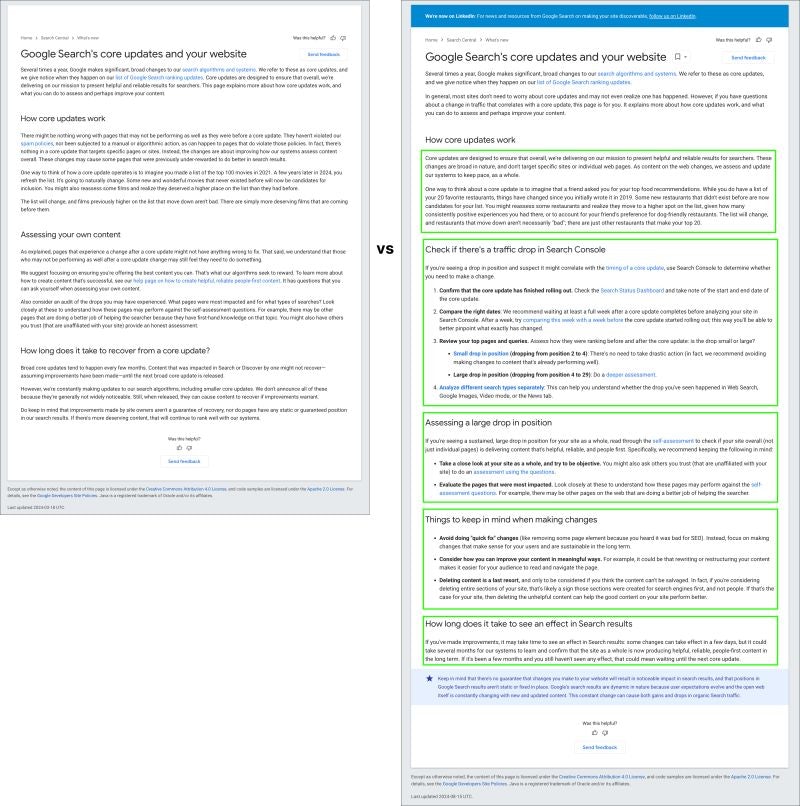
How core updates work
The first section which provides information about the inner workings of core updates has been reworded entirely. It still states general advice including that their mission is to “present helpful and reliable results for searchers” through their core updates and that the core updates are “broad in nature and don’t target specific sites or individual web pages”.
In addition to this, they have also added a new paragraph which provides further context to the intention of core updates:
“One way to think about a core update is to imagine that a friend asked you for your top food recommendations. While you do have a list of your 20 favorite restaurants, things have changed since you initially wrote it in 2019… The list will change, and restaurants that move down aren’t necessarily “bad”; there are just other restaurants that make your top 20.”
How to investigate a ranking drop
The second section goes on to provide advice if users suspect that they have experienced a ranking drop due to a core update. Firstly, they recommend confirming that the core update has finished rolling out by checking the Search Status Dashboard.
They then recommend waiting at least a full week after a core update before analysing your website using Search Console. Once this time has passed, they then suggest comparing that week with the week before the core update began rolling out.
In this analysis, they suggest reviewing any top pages and queries to assess for small drops (from position 2 to 4) and large drops (from position 4 to 29). If small drops are experienced, then they state that no drastic action is needed and you should avoid making changes to this content. For large drops, however, they recommend doing a deeper analysis and looking into different searches to determine where the drop happened.
Things to keep in mind when making changes
In another new section, they explicitly highlight the things that users should keep in mind when making changes across their websites. This includes avoiding making “quick fix” changes and instead focusing on how your content can be improved in meaningful ways that aid the user.
Deleting content is highly discouraged and only recommended if it is a last resort. Instead, users should look to salvage the content unless it’s unhelpful and has only been created with search engines in mind. If this is the case, they suggest that deleting unhelpful content can help the good content on your website perform better.
Length of time to see the impact of changes
Finally, they end the document by addressing how long users can expect to wait until they see results from making improvements. This advice is quite ambiguous, as they suggest that changes can take effect within a few days to several months. This is due to their systems working to determine how the site as a whole is contributing to providing helpful, reliable, people-first content. For users who haven’t seen any effect, they advise waiting until the next core update.
In early August, a federal judge ruled that Google has been using its dominance to create a monopoly, suppress competition, and stifle innovation. This decision follows the start of an antitrust trial a year ago and could significantly reshape how we approach search and online advertising.
The judge found that Google abused its market power by striking exclusive deals with device manufacturers and browsers to make Google the default search engine. In 2021 alone, Google spent $26 billion on these agreements. The judge pointed to Microsoft’s Edge browser, where Bing controls 80% of the search traffic, as proof that other search engines can succeed when Google isn’t the default.
These exclusive deals make it difficult for smaller search engines to grow, and they reduce innovation, allowing Google to avoid further investment in improving its search engine.
A new legal phase will begin on September 6th to determine what changes or penalties should be implemented to undo the damage and restore competition in the market.
How does this impact SEO?
If Google is required to change its algorithms as a result of this ruling, it could affect SEO strategies. Businesses might need to focus even more on high-quality, authoritative content and factors like E-E-A-T (Experience, Expertise, Authoritativeness, and Trustworthiness) to stay competitive.
Yelp sues Google over local search dominance
Shortly after a judge ruled that Google had illegally maintained its monopoly in search, Yelp filed an antitrust lawsuit against the tech giant, challenging its dominance in local search. In the lawsuit, Yelp alleges that Google has unlawfully exploited its monopoly to control local search and advertising, harming both competition and consumer choice.
Yelp accuses Google of engaging in anti-competitive behaviour by prioritising its own ‘inferior’ local search results and products over those of its competitors. They claim this diverts traffic and revenue from sites like Yelp, driving up their costs and making it more difficult for them to grow, while also restricting consumer options.
Yelp argues that Google’s local listings are ‘inferior’ because they are, on average, “shorter, more prone to error, less subject to quality control, and less useful to consumers” when compared with rival services.
In August, Google introduced Search Console recommendations, allowing website owners to easily access suggested actions to improve their visibility on the search engine.
These recommendations are based on data available in Google Search Console, such as indexing and crawling issues. The aim of this new feature is to make Search Console more user-friendly by offering direct, regularly updated suggestions.
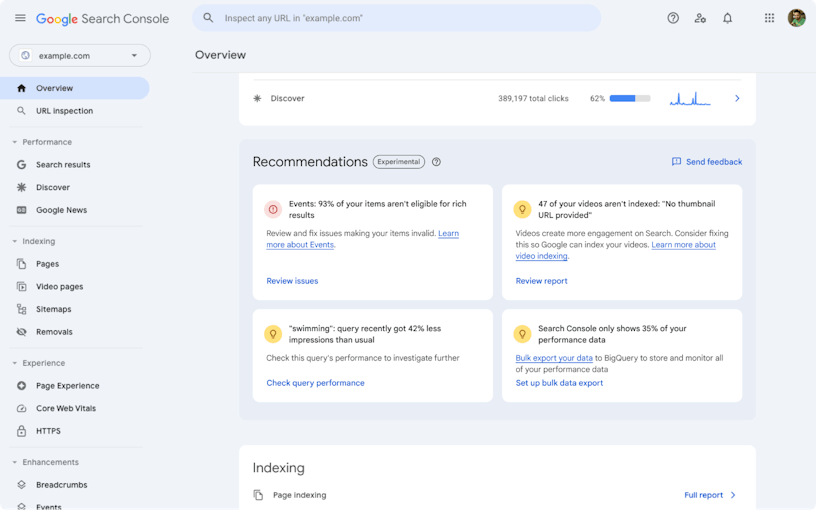
To access these recommendations, simply go to the Overview page. If you can’t see this feature yet, don’t worry—Google is rolling it out gradually, so it may not be available for your site just yet.
Does Google Search Console only show 35% of your data?
When the recommendations feature began rolling out on Google Search Console, some website owners noticed a suggestion to ‘bulk export your data’ due to Search Console displaying only 35% of their performance data.
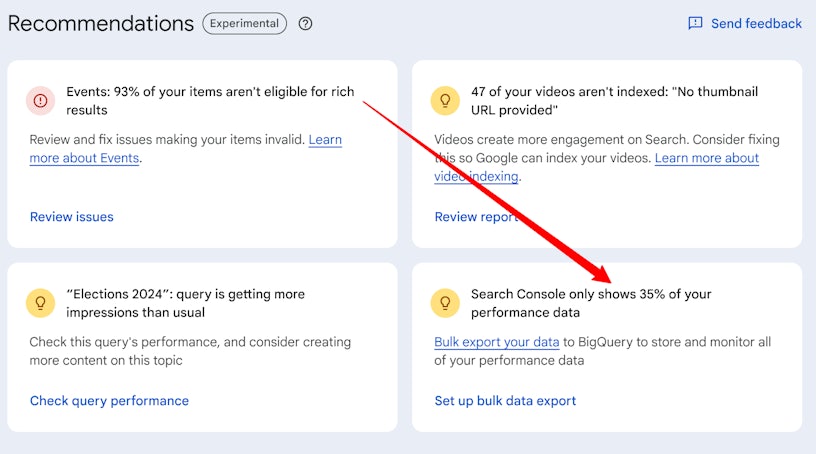
John Mueller addressed this, explaining that most sites will see all of their data in Search Console, but larger sites may receive less comprehensive data. If Google believes that a significant portion of your data isn’t being shown in Search Console, you may see this recommendation. If you don’t see it, you can assume the data displayed is representative of your entire site.
Although summer has only just ended, it’s never too early to start discussing the opportunities SEO professionals can capitalise on in 2025, as highlighted in the State of SEO Report.
Top challenges
Algorithm changes
According to Search Engine Journal, 22% of SEO professionals identified algorithm changes as their primary concern. Many of those surveyed noted that core and general algorithm updates were a major source of traffic instability over the past year. Interestingly, last year’s report showed that over half of those surveyed felt these updates had actually benefited their sites. This indicates that creating high-quality, authoritative content no longer guarantees a top spot in the SERPs.
Budget constraints
Another major challenge facing SEO professionals is budget constraints. This not only limits the scope of work SEO practitioners can perform but is also a leading reason why clients leave.
How could SEO change?
- Those surveyed predicted that AI will drive the most significant changes in the industry.
- 16% of respondents believed that algorithm updates will continue to play a key role in shaping the industry.
- Nearly 70% (69.8%) of SEO professionals observed increased competition in the SERPs over the past 12 months.
- Only 13.2% of respondents thought that zero-click searches would cause major shifts in the SEO landscape.
Access the full report by Search Engine Journal.









